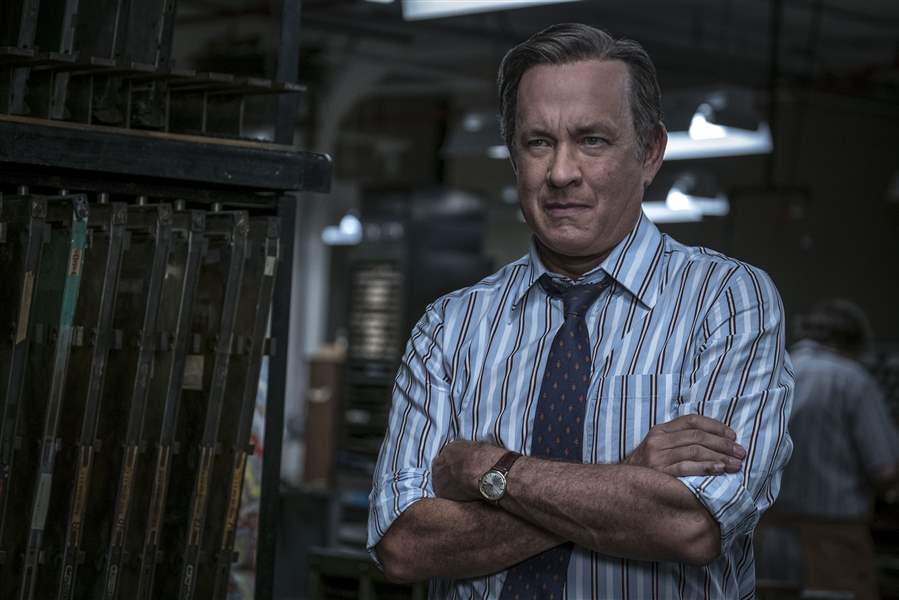
PEACH WEEKENDER | MOVIES
'The Post' captures media's role as a defense for democracy
1/10/2018
In this image released by 20th Century Fox, Tom Hanks portrays Ben Bradlee in a scene from "The Post."
ASSOCIATED PRESS
Freedom of the press issues, behind-the-scenes journalism, and a landmark court battle that never appears onscreen are not typical narratives for a major Hollywood film.
But these times are anything but normal. And neither was this watershed moment in 1971 The Post is based on:
President Nixon took the Washington Post and the New York Times to the Supreme Court to prevent further publications of classified government documents known as the Pentagon Papers that revealed a decades-old cover-up about our nation’s involvement in the Vietnam War; essentially, that former presidents and their advisers knew the war was not winnable, but dared not pull the United States out of the escalating conflict to save face.
Directed by Steven Spielberg. Screenplay by Liz Hannah and Josh Singer. A 20th Century Fox release playing at Franklin Park, Fallen Timbers, Levis Commons, Bowling Green, and Mall of Monroe. Rated PG-13 for language and brief war violence.
Running time: 115 minutes.
Critic's rating: ★ ★ ★ ★½
Cast: Meryl Streep, Tom Hanks, and Sarah Paulson
Jump to the present, a time when our President assails unflattering media coverage as “fake news,” and the parallels between a historical war on the press and an ongoing one are glaring.
It moved Steven Spielberg enough that he raced through The Post's production to ensure the film’s timely late 2017-early 2018 release.
The Post's message is similar to that of Spotlight, another champion of good journalism and winner of 2015’s Best Picture: The media, for all its myriad faults, is still an important bulwark for democracy, serving as a necessary check to those elected to power as well as informing citizens and voters.
But there are implications beyond even those paramount issues that are quite personal and potentially devastating.
Washington Post owner Kay Graham (Meryl Streep in a quiet performance that ends in an exclamation point) is caught between saving the family business by appealing to its shareholders and not battling the president, or joining the paper’s editor-in-crusader Ben Bradlee (Tom Hanks) in a march down a potentially calamitous path for the paper, her family's business, and her reputation should the Supreme Court rule against the Post and Times.
Of course, should the paper lose the court fight, it's not just Graham who would suffer: Bradlee is probably out of a job, as are several other editors and perhaps even several reporters.
The film moves with clockwork precision as the gruff-but-fair Bradlee leads his newsroom troops, pushing them, helping them, thanking them, and ultimately protecting them as a good leader does.
VIDEO: “The Post” official trailer
Casting Hanks as an indomitable force was easy; how the actor brings uncertainty and regret to Bradlee — such as being on the receiving end of a powerful lecture by his wife (Sarah Paulson) on the quiet bravery of Graham — is what gives the role depth. And Streep is so good with subtleties that Graham’s growing strength and personal empowerment are hardly perceptible until, at once, her transformation into an engaged leader who not only commands but demands equal respect among her peers in the evolving days of feminism is complete.
With such towering actors in the film’s defining roles, the remaining cast, including Bob Odenkirk, Bradley Whitford, Carrie Coon, David Cross, and Jesse Plemons fall into place to fill in as needed.
The Supreme Court, of course, ruled in favor of the Post and Times. Three years later, President Nixon resigned in disgrace from office, likely before being impeached, thanks in large part to dogged (and Pulitzer Prize-winning) Watergate reporting by the Washington Post.
That great irony hangs over the film.
But historical irony, no matter how relevant, means little to movie-goers if a film isn't well told and well executed. And few filmmakers tell and direct a story better than Spielberg, particularly when he’s as engaged and passionate about a project as he clearly is with The Post.
Contact Kirk Baird at: kbaird@theblade.com or 419-724-6734.